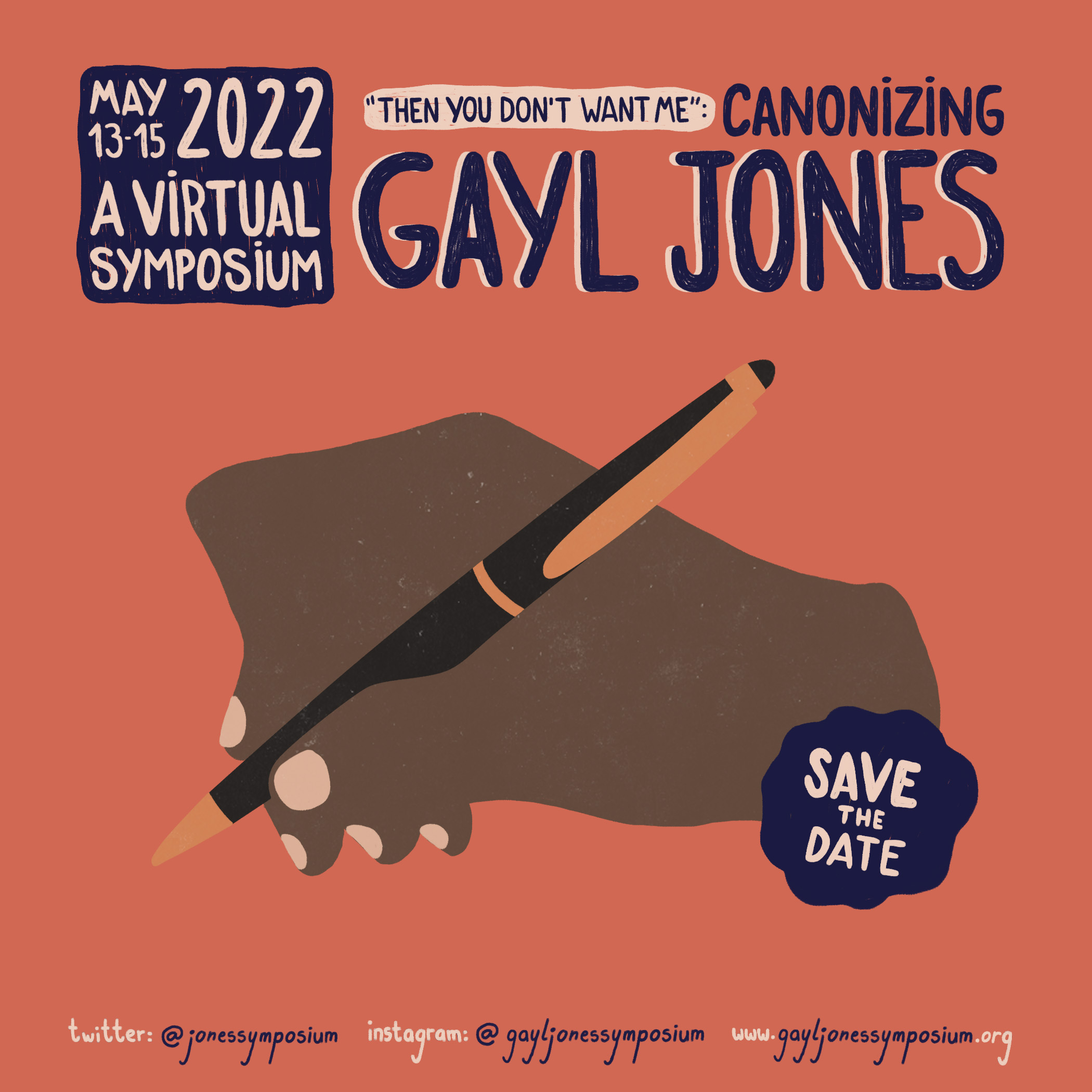”Then You Don’t Want Me”: Canonizing Gayl Jones—A Virtual Symposium
Call for Papers
Context
While Gayl Jones is best known for her debut novel Corregidora (1975), she has published many other literary works including multiple novels, poetry, a short story collection, a play, as well as an academic book on oral traditions in African American literature. Our virtual symposium in Spring 2022, exclusively dedicated to Jones’ work, will mark nearly 50 years since the publication of her first novel and will likewise be a celebration of her forthcoming novel Palmares (2021). In October of 2020, The Atlantic referred to Jones as one of the writers “that history forgot,” and this symposium will serve as a living, breathing document of assertion and remembrance of her scholarly impact on the humanities and the creative world.
In refusing to accept her placement at the periphery of the various canons and intersections of American literature, African American literature, and women’s literature, we also understand the limits of such frameworks of recognition. The canon itself is a problematic container, evinced both by the exclusion of so many BIPOC writers as well as by its tokenistic embrace. Gayl Jones has been refused by the traditional literary canon and the Black literary canon but one imagines she, too, would refuse to be so contained. This inspires our symposium title’s reference to the close of Corregidora: “Then you don’t want me,” Ursa repeats to her lover who wants the promise of pleasure without pain. Gayl Jones’ life and work spill over the edges of any promise of one without the other. She doesn’t feel like a safe pick. You’re all but guaranteed to get hurt.
Intervention
“Then You Don’t Want Me”: Canonizing Gayl Jones will more clearly and publicly carve out a space for Jones’ storytelling. The symposium promises to deepen and trouble the canon of African American women’s literature and Black feminism. Bringing together folks across disciplines, this symposium constitutively values interdisciplinarity and the mixed methods of these fields. As Gayl Jones has intervened into Black women’s literature through challenging representations of Black womanhood, the symposium strives to present divergent perspectives that press the boundaries of Black feminism. Additionally, as Jones has transformed fiction writing through her sonic play and investment in other senses beyond sight, we welcome experimental papers and projects that rethink the form and/or purpose of literary criticism. “Then You Don’t Want Me” will be structured around the importance of breath, breaks, and quiet reflection. We believe that this structure mirrors Jones’ life as a writer, as her public life is one of literary arrivals, physical and geographic departures, and years of pauses and privacy. Foremost, the symposium reflects Jones’ striking portrayals of the complicated lives of Black folk, with compassion and unflinching honesty.
By and large, criticism of Jones’ work focuses on the pathbreaking Corregidora. While this text is ripe with enduring and prescient themes (speech/silence/song, sexual and racial trauma, misogynoir, working class socialities, the afterlives of slavery) but the time has come to collectively broaden our engagement with Jones’ oeuvre. We are seeking new engagement with The Healing, White Rat, Raveena, Song for Anninho, Mosquito, The Hermit Woman, Chile Woman, Xarque and Other Poems, Liberating Voices, Eva’s Man, and Palmares. We seek to expand the ongoing conversation regarding her work and facilitate interdisciplinary communion with her archive.
Centrally, this symposium asks: what trouble does Jones produce for the canon of Black feminist literature? Of course, “canon” is a formation that straddles intentional and de facto boundaries. As such, we also come at the concerns of canonicity from the vantage point of keywords (for example “blackness” or “woman”) in order to ask, How does Jones rework, shape, or undo some of the central terms of African Diaspora Studies and Ethnic Studies, Gender and Sexuality Studies, Disability Studies, and beyond? Further, we are interested in engagement with questions of method and production, writing process, reading practice, pedagogy, and the multiplicity of intimacies that Jones’ work makes possible.
We seek fresh Black feminist perspectives that attempt to stretch Black feminism and that tend to complicate and disorient traditional frameworks. We also seek criticisms/analyses that incorporate Music/Sound Studies and Mad Studies and Crip Studies that challenge normative leanings within literary criticism. Moreover, we invite creative writers, academic writers, and lovers of Jones’ work who thoroughly embrace the unknowable and incomprehensible nature of her oeuvre. Suggested topics and approaches include but are in no way limited to: disability, queer intimacy, Afro-Brazil, pedagogy, archival practices, and inhabitations of the reality of the creative process. In addition to traditional conference paper presentations, we are planning for a variety of modes of engagement including roundtables, dialogues, and contemplative Q&A periods which involve intentional periods of silence to support listeners in processing information and posing thoughtful and urgent questions.
At the conclusion of the event, we will contribute a recording of the symposium to the Gayl Jones papers, maintained by BU’s Howard Gotlieb Archival Research Center.
We invite 250-500 word abstracts for papers and/or experimental pieces by June 1, 2021. Please submit your proposal via the google form: https://forms.gle/BdxZt8CKr4s34U3E8 If you have questions, feel free to contact us at: gayljonessymposium@gmail.com.
Conference Organizers
Ianna Hawkins Owen (Boston University, English and African American Studies)
Kianna Middleton (UC San Diego, Ethnic Studies)
Tala Khanmalek (CSU Fullerton, Women and Gender Studies)
For More Information
www.gayljonessymposium.org
tw: @jonessymposium
ig: @gayljonessymposium
